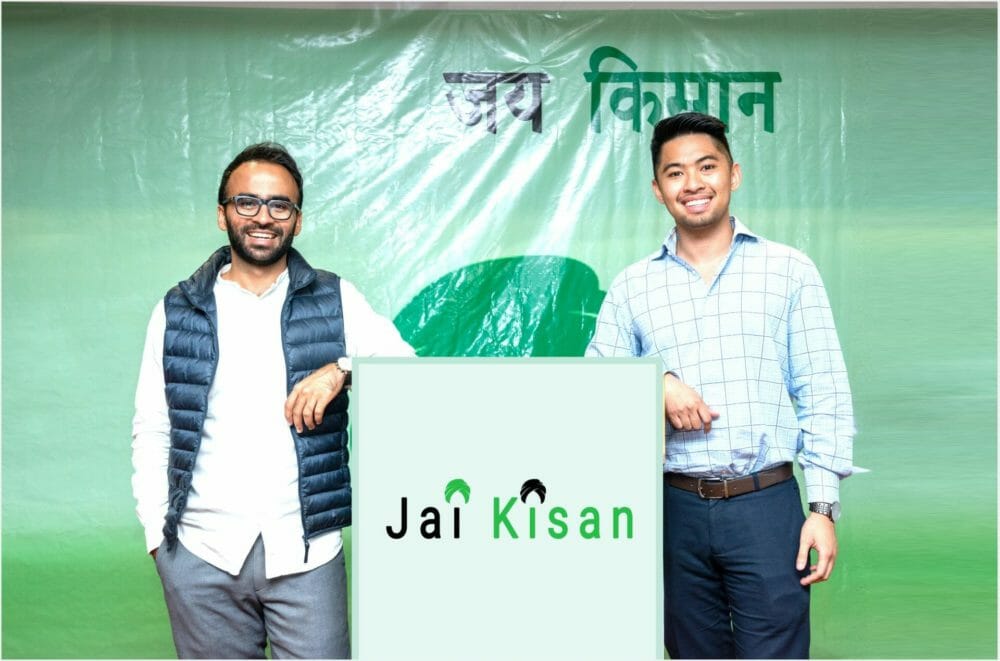Ask any shopkeeper, milkman, dhobi (launderer), or other merchant in India how many people owe them money for their services, and how much they’re owed. You’re likely to get two high numbers.
In fact, it’s common across the board for Indian businesses to serve their customers on credit and keep tabs. It’s true from the kirana kiosk selling cigarettes by the side of the street, all the way up to B2B enterprises selling equipment to farmers.
“In India, merchant credit isn’t just a service – it’s an expectation,” says Arjun Ahluwalia, co-founder and CEO of freshly funded rural fintech startup Jai Kisan.
The problem is that the people at the bottom of the chain — such as smallholder farmers and other low-income rural workers — can’t always enjoy the same access to credit as those farther up, even though they’re often the most in need of it. Their financing needs tend to be much smaller but are seen as higher risk because they typically lack documentation on their business operations and cashflow; many don’t have a bank account or credit histories.
As a result, many financing providers prefer to steer clear of lending to farmers. And even when they do, they’ll lend via rural service providers such as agribusiness input vendors or farming equipment leasers, who typically attach their own mark-up to the loan.
“Most lenders want to give large tickets, to maintain their unit economics [when they’re traveling] out to the hinterland of country,” Ahluwalia tells AFN. “They also give [the capital] to a buyer or seller in the value chain, rather than giving it directly to the end customer. The reason is it’s significantly easier to give it to an equipment manufacturer rather than the farmer, because then they would have to do smaller loans and underwrite the farmers.”
This means that capital “sits at the neck of the bottle rather than flowing down,” he says.
Full-stack rural fintech
It’s a problem that Jai Kisan is hoping to solve with its “rural fintech full-stack platform,” which adopts a B2B2C approach to partner with intermediaries in the agricultural value chain so that they can lend to farmers at lower costs.
“We are able to get this capital down to end customers by digitally onboarding them. And we do this extremely cheaply,” Ahluwalia explains.
The Mumbai-based startup partners both with businesses that sell to farmers, such as input or equipment providers, and those that buy from farmers, such as agri-commodity traders and food processing firms. These partners act as sales agents for Jai Kisan and its lender clients, by offering finance as an add-on to the inputs they sell or by placing a tablet or laptop in their outlets that farmers can use to sign up.
“The partner is excited by this because, say you are an equipment dealer and [previously] took capital from the bank to lend it on to a farmer, you had to take that debt onto your books. We integrate those sellers and buyers for that loan origination to be able to happen on the spot,” Ahluwalia says.
Partners can then cut their mark-up, leading to lower interest rates for farmers and quicker turnaround times for all stakeholders. Jai Kisan can also act as a middleman between these partners and apex lenders, allowing it to cut interest rates to farmers even further by sourcing the best deals it can.
In the past six months, the startup has disbursed over ₹500 million ($6.56 million) in loans to over 5,500 borrowers across 10 states. It has partnered with three “blue chip” banks and five non-bank financial institutions, including microloan-focused Avanti Finance.
Arkam leads; first for Nabard
Investors seem to be impressed; Jai Kisan has just raised ₹300 million ($3.94 million) in a pre-series A funding round led by Arkam Ventures. Also joining in the round is NABVentures — the VC arm of Indian development finance institution (DFI), the National Bank for Agriculture and Rural Development (Nabard) — in its first-ever investment.
“Very few startups have the commanding view of a large, untapped space. Even fewer startups have the luxury of tailwinds in these challenging times,” said Arkam Ventures managing director Rahul Chandra in a statement.
“Jai Kisan is a rare combination of both of the above along with a unique business model that adds value to multiple participants of the agri-supply chain.”
Existing investors including Blume, Prophetic Ventures, and Better Capital also participated in the round alongside several other investors from the finance and agriculture sectors.
Fellow Indian startup GramCover also closed pre-Series A funding recently for its tech-enabled rural insurance network. Read more here
Jai Kisan plans to use its new funding to hire for roles across operations and tech, make its tech platform more robust to attract more DFIs and other lenders, and to leverage the customer data it has amassed to expand its offering beyond loans to other credit, insurance, and savings products.
It also wants to scale up geographically. Initially, this means expansion to more states within India. But the longer-term plan is to take its model to other markets in Asia and farther afield where the agricultural industry is dominated by lower-income, ‘underbanked’ smallholders. Jai Kisan co-founder and chief operating officer Adriel Maniego’s home country of the Philippines may well be the startup’s first international stop.
He and Ahluwalia are former classmates from Texas A&M University in the US, where they later began careers in private equity and debt restructuring.
“Adriel and I started Jai Kisan to facilitate rightly priced credit to rural borrowers,” Ahluwalia says. “It didn’t make sense to us that a poor woman borrower in the middle of nowhere is expected to generate over 24% IRR on a small, ₹50,000 ($655) type of loan, while in our previous jobs we were expected to generate a meagre 12% IRR for our LPs armed with billions of dollars in capital.”
Got a news tip? Email me at [email protected]





